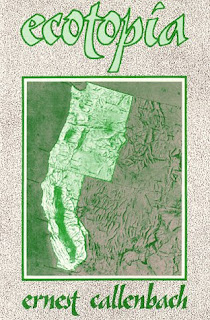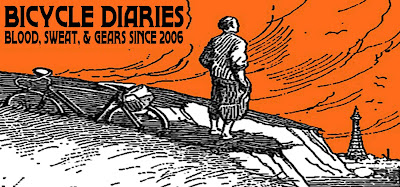Ecotopia
an interview with Ernest Callenbach,
author & environmentalist
author & environmentalist
 One of the great things about a new job (and one that's vastly different from what I've done in the past) is the learning curve. I typically begin with books I hope will become solid and (hopefully) interesting bridges to new fields of knowledge.
One of the great things about a new job (and one that's vastly different from what I've done in the past) is the learning curve. I typically begin with books I hope will become solid and (hopefully) interesting bridges to new fields of knowledge. The book that's been the most helpful so far, is Ernest Callenbach's Ecotopia: The Notebooks and Reports of William Weston. Published in 1975, it describes a near-future in which the American northwest declares independence from the US. The resulting country, Ecotopia, then organizes the first sustainable, ecologically focused society. Although I had never heard of it before, the book has had an incredible impact on both the counterculture and the green movement since the 70s.
The book that's been the most helpful so far, is Ernest Callenbach's Ecotopia: The Notebooks and Reports of William Weston. Published in 1975, it describes a near-future in which the American northwest declares independence from the US. The resulting country, Ecotopia, then organizes the first sustainable, ecologically focused society. Although I had never heard of it before, the book has had an incredible impact on both the counterculture and the green movement since the 70s. I found it so enjoyable, I decided to contact Mr. Callenbach to propose a short email interview. Not only did he graciously agree; but he gave me permission to post his answers to my questions. He prefaces his answers to my six questions with, You ask hard questions! But I will try to say something about them all. Then he jumps right on in!
I found it so enjoyable, I decided to contact Mr. Callenbach to propose a short email interview. Not only did he graciously agree; but he gave me permission to post his answers to my questions. He prefaces his answers to my six questions with, You ask hard questions! But I will try to say something about them all. Then he jumps right on in!1. It's been over 30 years since you wrote Ecotopia. If you wrote it today, would it be different? If so, how and why?
Immodestly, I still think that the basic assumptions and lines of projection are sound. We will have to learn to live in a society with lower consumption of energy and goods; we will have to live more convivially, cooperatively, and supportively; we will have to pay more attention to biology (in the largest sense) than to physics and economics. The other day I read an enthusiastic planner envisaging a sustainable small town: it was almost exactly what I imagined 30 years ago in the Ecotopian mini-cities.2. Have you found that readers' reactions have changed over the years?
Of course I would make some emendations: the Ecotopians' already existing preference for electronic communication over moving bodies around would be extended, for instance. (Their system of book distribution has finally emerged into reality, I see.)
In the beginning, you had to have some familiarity with environmental thinking to grasp the point of the book. Passing it on to qualified friends was almost a secret activity. Nowadays almost any high-school student sees the point instantly--which makes some find it old-hat, and some marvelously prescient. There is still a mysterious-to-me divide between libertarian types of readers who dislike any kind of group standards, and people who worry that Ecotopia is too humane to survive in the dirty world of modern politics. (I have been accused of being a fascist, a communist, a racist, etc., mostly by people blessedly innocent of the anarchist tradition of thought.)3. Has Ecotopia been received differently in different countries?
The most ardent reception was in Germany, where it appeared just as the Green Party was emerging; it has sold proportionately far more copies in Germany than in the US. Quebec people also liked it, probably because it is, after all, a secessionist story. The Brits hated it; one reviewer passionately accused me of not recognizing that UK farmers have recycled manure for hundreds of years. (In Bali, of course, thousands.) The reception in France was good, possibly because Ecotopian society has some resemblances to France (and Japan). There is an Ecotopian Club in Tokyo, whose members are demon composters and read the book in English to improve their language skills. . . .4. How do think Ecotopia has affected the environmental movement?
The book is a bright little beacon of hope, especially for young readers. It has probably recruited a certain number of people into environmental/political work. And because vision is a necessity for any successful movement, I think it has served a useful function of crystallizing what people are for, not just against. Amazingly, it is still the only game of that sort in town. Writing the book was, I think in retrospect, harder than it looked; I have often recommended when lecturing in other bioregions that people write an ecotopia appropriate to their circumstances and their culture, but the only one I know is GREEN HAWAII, by Ira Rohter (?). Actually my favorite of all the reviews the book has received was early on, from the Portland ecological journal RAIN: "It looks easy--like the wheel."5. Why did you choose the SF genre?
But I sometimes describe my role in creating it as rather like that of a quilt-maker: I found the brightly colored bits, and trimmed and arranged them in an attractive pattern, but I didn't weave the cloth-- our society, and particularly the society of the San Francisco Bay Area, did.
It's NOT science fiction--you might call it "politics fiction." Where SF makes novel physical (and sometimes social) assumptions, I make novel political ones: that a region comes to understand its ecological plight, and decides to do something about it. Another term might be "future fantasy," a category which I would (very shyly) share with Ursula LeGuin, who I take to be the most important American writer of the last fifty years or so.6. I believe the strength of Ecotopia is that portrays a society that is far from utopian. For example, representatives of the security services monitor the opposition. Have you ever gotten criticism for portraying Ecotopia as less than perfect?
Yes, I don't really think of it as a utopia myself--I hung around with anthopologists a lot during the years before I wrote it, and tried to imagine a society in which people were no better than we have been till now. (George Bernard Shaw had some interesting things to say about that in his preface to CAESAR AND CLEOPATRA.) And I know that even small and remote countries need intelligence services--even Iceland and New Zealand have them. But most readers don't seem to worry about this issue; if I were a better writer, maybe I could have dramatized it better, though I didn't want it to be a big deal. As Weston recognizes somewhere, in Ecotopia ordinary gossip and neighborly observation do much of the work of police and secret service. I do think that some readers feel uncomfortably challenged by Ecotopian life: would they be able to fit in, would they feel rebellious (as most young people do now, in our enormously different circumstances), would they be able to live happily with much less privacy than in our anonymous and alienated world?
Labels: books, enviromatters, serious shit, writing







0 Comments:
Post a Comment
<< Home